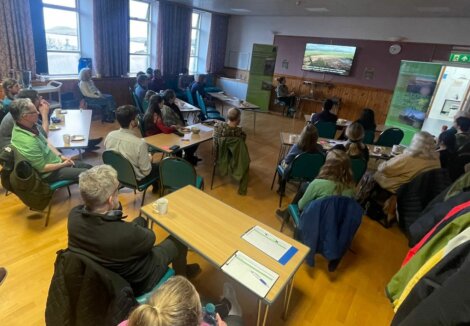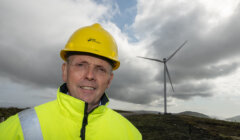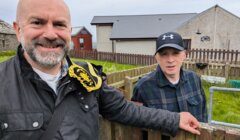Politics / End of power sharing agreement a ‘good thing for Scottish Greens’ – Armitage
THE SCOTTISH Greens are in a stronger position following their sacking from the Scottish Government, according to local councillor Alex Armitage.
He also predicts a further erosion of first minister Humza Yousaf’s authority over his own party which, he says, has shifted markedly to the right since the resignation of former first minister Nicola Sturgeon.
Armitage, who is Shetland’s only Green councillor and the party’s candidate in the Northern Isles at this year’s general election, said he had been leaning towards ending the power sharing agreement with the SNP, but events today (Thursday) have overtaken any decision by his party on the issue.
He confirmed that he was one of the members who signed a letter requesting an extraordinary general meeting within the party on the matter. That meeting, should it take place, will now have a different agenda.
Speaking shortly after the news of the end of the Bute House Agreement broke on Thursday morning, Armitage said Yousaf’s decision to scrap the Bute House agreement appeared to have been made in the ‘heat of the moment’.
“Humza Yousaf is feeling a lot of political pressure from the right wing of the SNP. He has taken this top-down unilateral decision as a means of shoring up his own position within the SNP,” he said.
“But it is leaving the SNP in a weaker position, and I feel the people of Scotland are less well represented now.”
He added that ever since the council tax freeze announcement by the SNP earlier this year and the ditched target to cut the country’s carbon emissions by 75 per cent by 2030, it was right for the Greens to reassess their position.
“There is a lot of opportunity for us as a party to bring in policy positions from the opposition; we have done this successfully in the past,” he said.
Become a member of Shetland News
“In disconnecting us from the bad things in the Scottish Government, we are in a position where we can be free to advocate our Green vision for Scotland without the pitfalls of being tied to an SNP government.
“We are in a position where we could win significant policy concessions from a minority Scottish Government, so, politically, this can be a really good thing for the Scottish Greens.”
He said when the Greens went in government in 2021 there was a “lot of shared purpose” with Nicola Sturgeon’s SNP, adding that there was potential for progressive policies.
“I feel that as time has gone on, it feels like a lot of the policies that the Greens have been pushing through have been stalled,” Armitage said.
“In a way it’s not so much to do with the SNP but the UK Government – the gender reform recognition was stymied by the UK Government, and the deposit return scheme was again stalled by the UK Government.”
Armitage also said he “really disagreed” with cuts being made to college education, including at UHI Shetland.
On climate, the councillor said he felt the Scottish Government has “only been tinkering” on the issue rather than instigating radical change.
The decision to scrap the 2030 target was announced on Thursday in the Scottish Parliament.
It came alongside a new package of climate action measures including increased electric vehicle charging and a carbon tax on large estates to incentivise peatland restoration.
Net zero secretary Màiri McAllan said the government remains “unwavering” in its commitment to reach net zero by 2045.
But new legislation will be brought forward to introduce “carbon budgets” every five years instead of annual targets.
The government said the UK-wide Climate Change Committee’s (CCC) recently noted that the 2030 target for emissions reduction was not achievable.
Armitage said: “We need to see more leadership from our politicians – especially Green politicians, and my personal reflection is that I need to be doing more in this regard.
“I think about all the babies and toddlers I have met in the last few months – folk who will live to see the year 2100 – and I fear for the world that we are leaving them.”
Climate Café
The news was announced by the government on the same day the first Shetland ‘climate café’ event was held.
Organisers Andrea Sanchez, Ayesha Huda and Deepa Shah introduced the climate café as an informal and welcoming place for people to share their feelings, ideas, hopes and concerns about the climate, and how folk can support and encourage each other as a community.
Shah said: “The climate crisis is something that many folk are concerned about and we wanted to create a space to come together to speak about the challenges we face, and how we can come together as a community to find a positive way forwards.
“It was fantastic to see dozens for folk there last night and we hope to see many more joining us at our next event.”
The event, which was supported by climate advocacy organisation Uplift, included a talk on peatland restoration by Sue White.
The next climate café will take place at Islesburgh from 6pm on Thursday 16 May.
Meanwhile among the new measures announced by the Scottish Government last week was the publication of a route map to a 20 per cent reduction in car kilometres.
There will also be a new route map for the delivery of around 24,000 additional charge points by 2030 through a mix of public and private finance.
The government also aims to develop a new national integrated ticketing system in Scotland across all modes of public transport.

















































































